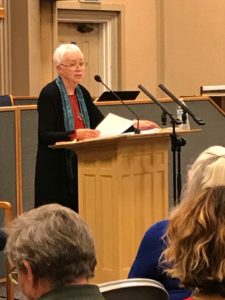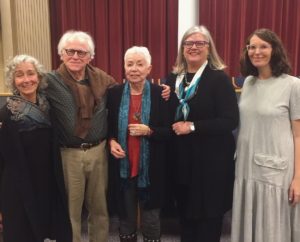 Carol Lynn Pearson was presented with the Association for Mormon Letters Lifetime Achievement Award on March 29, 2019, at the Berkeley LDS Institute. A panel was held in her honor, followed by remarks and readings by Carol Lynn. The panel was made up of Rachel Hunt Steenblik (chair), Bob Rees, Kathleen Peterson, and Kathryn Pritchett. Joanna Brooks was also scheduled to participate, but was unable to come because of illness. She did send her remarks, which she has given permission for us to publish. After the panel, Carol Lynn did a reading from her poetry, prose, and theater, including new poems, and selections from her one-woman play “Mother Wove the Morning.” You can see a video of the entire event here.
Carol Lynn Pearson was presented with the Association for Mormon Letters Lifetime Achievement Award on March 29, 2019, at the Berkeley LDS Institute. A panel was held in her honor, followed by remarks and readings by Carol Lynn. The panel was made up of Rachel Hunt Steenblik (chair), Bob Rees, Kathleen Peterson, and Kathryn Pritchett. Joanna Brooks was also scheduled to participate, but was unable to come because of illness. She did send her remarks, which she has given permission for us to publish. After the panel, Carol Lynn did a reading from her poetry, prose, and theater, including new poems, and selections from her one-woman play “Mother Wove the Morning.” You can see a video of the entire event here.
In Honor of Carol Lynn Pearson
By Joanna Brooks

Quite accidentally when I was preparing these remarks I came across a 1968 BYU Studies review by one Professor Edward Hart of a book of poetry entitled Beginnings. The review is a gem of Mormon Studies misogyny and should be read only if to help us recognize that spirit which still abides among us. But for the sake of economy and emphasis, I’ll summarize the main points here. High praise Professor Hart offers at first for the young poet Carol Lynn Pearson’s “devotion” and “earnestness,” before he resorts to the kind of formalist scolding only the rearguard of literary criticism was still indulging as the world burned down in 1968. Just about everyone else, and every social movement poet especially, had by that time followed our great American forebearers like Walt Whitman into the democratic and embodied forms of free verse, but not Professor Hart, who at the outset dismisses Beginnings as not even qualified to be called poetry on account of its resistance to formalism. And, what’s more, as his paragraphs roll on, he confesses not only to rejecting the work but to his “annoyance” and “repugnance” with some of the figurative language. And then Professor Hart’s real issue breaks through: he can’t stand Beginnings, it turns out, because birth—a governing conceit for the book, a metaphysics born of what some women do with our actual bodies—is frightening:
Not being a mother myself I am overpowered in the fetal presence not unlike a father in the waiting room but here it is not so much the words that betray me into uneasiness as it is the pictures. Somehow the adult in the fetal position on the dust jacket puts me off reminding me of nothing so much as those unfortunates huddled in this position in sad regression on the floors of the state hospital. . . . The author has forgotten that in the beginning was the word and not the picture.
Actually, I think the author was bold enough to remember that in the beginning was the mother, and the womb of the mother, and that in a house made motherless by purposeful repression of the mother, the reality of human experience is indeed terrifying, and that what a powerful mother does is hold us and see our complicated truths and soothe us through them. Which is what Carol Lynn Pearson has done for this community for the last fifty years, quite in defiance of Professor Hart’s closing exhortation that the young poet in time would come to “submit herself to the disciplines of the craft” (yes, that’s a quote). And aren’t we glad she never did submit herself to the various forms of discipline Mormon women face. (Cue Heather Harris Bergevin’s brilliant poem on the scold’s bridle.)
But leaving Professor Hart, I’m going to share with you four reasons why I honor her, wholeheartedly, and four lessons I take from her that have shaped me as a Mormon writer. Carol Lynn here is what you mean to me.
- You remind us that one of the meanings of Deseret is industry.
Everyone—every Mormon writer especially—should know the story of your first book, Beginnings, with illustrations by the now revered gay Mormon artist Trevor Southey. You were rebuffed by every publisher you approached. So you and your husband published it yourselves—2,000 copies—and sold out, and republished it, and lugged cardboard boxes to bookstores and kept selling, and gave us one of the most impactful and significant bodies of poems in our cultural history. We do not stop because institutions do not see us, yet. We do for ourselves. We build.
And we keep building. Look at the magnitude and impact of your career. From the early collection of historical writings, Daughters of Light—a collection of records of the spiritual gifts of women in the early LDS Church, published by Bookcraft in 1980, to the commercial success of Goodbye, I Love You and your Christmas books—you have shown us that it is good and powerful to use art to give people what they need. And doing so keeps you busy. Industry!
- Your art consistently draws its beauty from the language and experience of the Mormon people.
When I say the Mormon people, I am cautious. There is an ethnic Mormonism, forged out of the English and Scandinavian cultures of many pioneers from the elements of our shared experience and the Ute, Paiute, and Shoshone landscapes we have occupied, and it certainly has played an enormous role in our culture. But the Mormon people are also Maori, African-American, Chilean, Navajo, Tongan, Korean, and the way we choose to speak to each other has a tenderness, a sweetness, a plainness born of pragmatism and frugality, and rounded edges. We feel and hear it in My Turn on Earth and Mother Wove the Morning, in the true-to-life parody of “The Pink Moccasins.” Your aesthetic draws from the humble and profound. As you wrote in “The Cast,” first published in the New Era in 1976:
As I walk through the scenes,
Watch the costumes move,
And listen to the lines
Of the powerful, the weak,
The rich, the poor,
I look at the leads with less awe than most,
And at the spear-carriers with more.
You have taught us time and time again that there is poetry in the very marrow of Mormonism, in our plainest truths, our homespun transcendence.
- You taught us that sharing what is difficult, different, and unorthodox is powerful and good.
These are not contradictory: the sweetness, plainness, and rounded edges of the way we speak with one another and the challenging truths of our lives. The former serves as a container for the latter. You have shown us how to hold our struggles close, from the quiet internal struggles you depict as the aging Mormon characters in poems like “Millie’s Mother’s Red Dress” come to terms with life choices, to way you fearlessly made public your struggle as you witnessed your husband come to terms with his sexuality and die from HIV/AIDS. From the valuable material of her struggles you have offered witness, acknowledgment, understanding, hope, and honor to others. You have played a prophetic role in extending love and recognition to LGBTQ and questioning Mormons. And even yet, miraculously, you found a way to offer it through the institutional church—through the children’s hymn, “I’ll Walk With You.”
- You keep showing up for the young ones.
We have been struggling as Mormon people to understand how to live with the complexities of faith, especially those of us raised during a time of correlation and bureaucratization. But with a persistent brightness of hope that has nothing to do with innocence, you show up and embody that Mormonism has always been complicated and that holding complication in love is the highest responsibility of a faith community—it is, in fact, redemption. Thank you, Carol Lynn, for showing up at Feminist Mormon Girls Camp, so our sons and daughters could touch you and say they knew you, could sit at your feet under the trees up Hobble Creek Canyon. Your willingness to show up for us, to stand on the edge and face west towards the future—as you capture in your essential poem “Pioneers”—is, perhaps, the secret to your perpetual youth, beauty, and power.
Thank you, Carol Lynn, for being a mother of Mormon feminism, the mother of contemporary Mormon poetry and drama, and for soothing and encouraging us in more ways than you will ever know.

You can see a video of the panel honoring Carol Lynn, and Carol Lynn reading from her poetry, prose, and theater, including selections from her one-woman play “Mother Wove the Morning,” here:
fbclid=IwAR1vZ5BW-AYonUbpYQxOtd4h50ImhPeVi1x7iAntyoLRQpQzJdujHlP2FTw